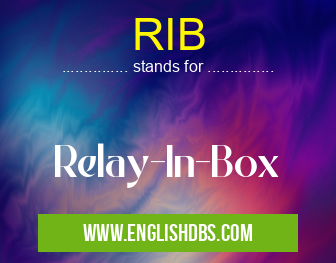What does RIB mean in PRODUCTS
Abbreviations are a common way of representing words or phrases, especially in the business world. RIB is an acronym for the phrase “Relay-In-Box”, and it is used to describe a type of electronic circuit board that helps control electrical functions. This article will explain what RIB stands for, how it works, and its importance in the electronics industry.

RIB meaning in Products in Business
RIB mostly used in an acronym Products in Category Business that means Relay-In-Box
Shorthand: RIB,
Full Form: Relay-In-Box
For more information of "Relay-In-Box", see the section below.
What Does RIB Stand For?
RIB stands for “Relay-In-Box” which refers to a type of electronic circuitry component that contains both relays and other components housed in a closed box. The main purpose of this kind of circuitry is to act as a controllable switch between two devices, so that one may be able to provide an output signal when the other has provided an input signal. A relay-in-box consists of several discreetly connected components such as resistors, inductors, capacitors and diodes which all perform specific roles within its overall function.
How It Works:A typical relay-in-box system consists of two devices which are linked together by at least two wires; one provides power or an input signal while the other responds with an output signal. The most common arrangement is that of a single resistor placed between the input device and a coil (or group of coils), each linked to its own switch (or contacts). When activated by either power or an incoming input signal, the resistor allows current to flow through it, triggering one or more relays enclosed within the box to open or close their contacts accordingly. This then allows either more current to be drawn from the source device (to create an output) or further signals from being sent back to it (as feedback).
Why Are They Used?:Relay-in-boxes are mainly used whenever there must be some form of logic control in place over user inputs or simple switching operations; they can help cut down on time consuming wiring work needed when components would normally have been wired directly together. Their use extends beyond just consumer electronics such as TV remotes into industrial applications where multiple machines need coordinated commands in order to operate correctly in unison. As such, these boxes have become not only cost effective but increasingly reliable across many different platforms making them popular amongst many engineers
Essential Questions and Answers on Relay-In-Box in "BUSINESS»PRODUCTS"
What is a Relay-In-Box?
A Relay-In-Box (RIB) is an efficient power distribution unit that allows for remote control of electrical equipment and systems. It provides a cost-effective and safe way to connect, switch, monitor, protect, and control various types of electrical equipment.
How does a RIB work?
A RIB works by providing an interface between input signals from transmitting devices, such as controllers or switches, and output devices such as relays, contactors, motors, lights and others. An appropriate connection is made between the input and output devices through the RIB using cables or junction boxes. The output device then uses the signal from the controller or switch to operate.
What are some of the advantages of using a RIB?
There are several key advantages to using a RIB for power distribution. Firstly, it reduces installation time due to its easy connection design. Additionally, it increases safety as all components are enclosed in one unit and it can also be easily installed in harsh environmental conditions such as dusty locations or outdoor sites with rain or snow. Lastly, it helps ensure energy efficiency due to its ability to monitor energy leakage and alert users if any irregularities occur.
What safety features do RIBs have?
Relay-In-Boxes typically have several safety features built into them. For starters, they come with circuit protection features such as overcurrent protection which prevents damage to circuits under high current circumstances. They also come with surge protection which protects against voltage spikes caused by external events like lightning strikes. Other additional features may include earth leakage detection which helps detect ground faults that could cause an electric shock hazard; short circuit protection which helps prevent arcing and fire hazards; electromagnetic compatibility blocking that prevents interference caused by strong interferences in industrial applications; and overvoltage protection which prevents equipment from being damaged by high voltages.
Are there any downsides to using a RIB?
One potential downside of using a RIB is its higher cost compared to other relay solutions available on the market. Additionally, some applications may require specialized connections for motors or other specialty items that may not be supported by the more generic designs offered by most RIBs on the market today.
What types of applications can use a Relay-in-Box?
A wide variety of applications can benefit from using a Relay-in-Box including industrial automation projects like motor control systems, lighting control systems, HVAC systems , access control systems etc., solar PV projects , data centers , commercial buildings , home automation projects , elevator controls etc.
Is there any maintenance involved with using a RIB?
Generally speaking regular maintenance should not be required when using a Rib unless you experience issues such as corrosion over time due exposure harsh weather conditions etc . In this case you may want to inspect your system once every 6 months or so ensure everything still working correctly.
